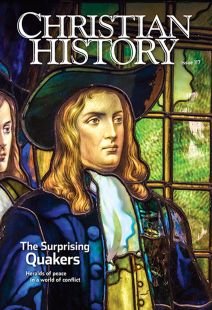Editor's note: Quakers
ONE of our editorial staff was first introduced to the Quakers through the old rhyme “Quaker meeting has begun,” employed by her mother to quiet the troops. (Read it in “Did you know?” on the inside front cover.) In my case, it was the Marguerite de Angeli children’s book Thee, Hannah! that opened my eyes to Quaker plain dress and commitment to abolition. Thirty-five years later, I still recall Hannah’s doleful contemplation of her non-Quaker friends’ much fancier bonnets.
Some of us pass plain white Quaker meeting houses during our daily commute. Many know of Quaker contributions to British and American history. We might even know of George Fox, William Penn, and Elizabeth Fry, and realize that famed poet John Greenleaf Whittier and two US presidents were Quakers (Herbert Hoover and Richard Nixon).
Order Christian History #117: The Surprising Quakers in print.
Subscribe now to get future print issues in your mailbox (donation requested but not required).
But the full story is much more complicated. Quakerism began in a time of political and religious unrest in seventeenth-century England, in the chaos of a country that had beheaded its king and changed its religious course; it crossed the ocean to America, where Quakers got an entire colony to run (Pennsylvania); and today it continues in great numbers in Africa, where new generations are hearing the Quaker message (see p. 36).
Seeking the light
Through the years Quakerism has been marked by distinctive “testimonies”—simplicity, silence, nonviolence, equality, and communal decision-making—but their practice varies widely. Modern Quakers range from groups almost indistinguishable from American evangelicals to those who frame the “Inner Light” (traditionally, Christ’s light within) as a kind of universal divine. In their 350-year story, we discover abolitionists, prison reformers, and peace marchers, but also Quakers who went naked as a sign of impending judgment, Quaker chocolate makers who set up humane workplaces during the Industrial Revolution, and Quakers who fought in the Civil War. We even find out that Quaker Oats has nothing to do with Quakers and that Whittier wanted to be remembered for much more than writing “Dear Lord and Father of Mankind.”
What ties all these people together? One of our authors shared this statement from a group of Quakers attempting to reach consensus in 1985:
We have often wondered whether there is anything Quakers today can say as one. After much struggle we have discovered that we can proclaim this: there is a living God at the centre of all, who is available to each of us as a Present Teacher at the very heart of our lives. We seek as people of God to be worthy vessels to deliver the Lord’s transforming word, to be prophets of joy who . . . can testify to the world, as George Fox did, that, “the Lord God is at work in this thick night.” Our priority is to be receptive and responsive to the life-giving Word of God . . . through the written word—the Scriptures, the Incarnate Word—Jesus Christ, the Corporate Word—as discerned by the gathered meeting, or the Inward Word of God in our hearts . . . available to each of us who seek the Truth. CH
Jennifer Woodruff Tait
Managing editor, Christian History
P.S. In issue 118 of CH, we’re going to reintroduce a letters to the editor page. You already write us a lot, so please keep it up! Some of the most thought-provoking, interesting, and occasionally corrective letters will be selected. We’re happy to be bringing this feature back.
This article is from Christian History magazine #117 The Surprising Quakers. Read it in context here!
By Jennifer Woodruff Tait
[Christian History originally published this article in Christian History Issue #117 in 2016]
Next articles
Seeking the light of Christ
George Fox and Margaret Fell formed their movement in a turbulent era of church history
Max L. CarterA woman with a message
Margaret Fell insisted she and other women had the right to preach
Margaret FellSupport us
Christian History Institute (CHI) is a non-profit Pennsylvania corporation founded in 1982. Your donations support the continuation of this ministry
Donate




